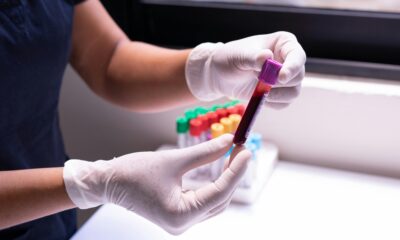Health
Opioid Addiction Treatment Options Available Now
Published
12 months agoon

Opioid addiction is a significant public health challenge that affects individuals and communities globally. Misuse of opioids such as prescription painkillers or illicit substances like heroin has contributed to rising addiction rates and related harms; yet with effective treatments approaches individuals can overcome opioid dependence to regain control over their lives and return home safely.
We will examine opioid addiction treatment, discussing various approaches that can assist individuals to break away from addiction and find long-term recovery.
Before exploring treatment options for opioid addiction, it is necessary to gain an understanding of its nature. Opioids interact with brain receptors to produce feelings of euphoria and pain relief; over time however, repeated use may lead to dependence and addiction as your body adapts to having access to them.
Opioid addiction is characterized by compulsive drug seeking behavior, withdrawal symptoms upon cessation and negative impacts in multiple aspects of life. It affects people of all ages, genders and socioeconomic classes alike.
Common Treatment Approaches
There are various approaches available for opioid addiction treatment; oftentimes the most successful one involves tailoring interventions specifically to an individual. Some common approaches for treating opioid dependence are as follows.
Medical detoxification, often the first step of treatment, involves medically assisted withdrawal of opioids. Medical detoxification helps manage withdrawal symptoms while protecting personal safety and comfort for all involved parties involved in detoxification.
Medication-Assisted Treatment (MAT) Medication-Assisted Treatment (MAT) combines FDA-approved medicines with counseling and behavioral therapies such as methadone, buprenorphine, or naltrexone in order to alleviate cravings, ease withdrawal symptoms, or block the effects of opioids.
Behavioral Therapies
Behavioral therapies play an integral part of treating addiction. Therapies like cognitive-behavioral therapy (CBT) and contingency management aim to change behavior, identify triggers, develop coping skills and bring about long-lasting behavioral change.
Supportive Care and Aftercare
Supportive care and aftercare services offer ongoing assistance and assistance for individuals during recovery. Services may include individual counseling, group therapy sessions, support group membership and vocational training services as well as housing or employment assistance.
Medication-Assisted Treatment (MAT) is an increasingly effective approach for opioid addiction treatment, using medications like methadone or buprenorphine combined with counseling and behavioral therapies such as therapy groups to manage cravings, reduce withdrawal symptoms and stabilize lives. MAT helps individuals control cravings more effectively while improving quality of life overall.
MAT medications work by binding to opioid receptors in the brain, relieving cravings and preventing withdrawal symptoms while offering safer alternatives than illicit opioids, enabling individuals to continue functioning normally during treatment.
Behavioral Therapies
Behavioral therapies play an integral part of opioid addiction treatment. They assist individuals in recognizing harmful behavior, creating effective coping mechanisms and addressing any underlying psychological factors contributing to addiction. Here are some commonly employed Behavioral therapies in treating opioid dependence:
Cognitive-Behavioral Therapy (CBT)
CBT helps individuals recognize and alter negative thought patterns and behaviors. CBT emphasizes identifying triggers as well as creating healthier coping mechanisms in order to successfully manage cravings while making more responsible choices.
Contingency Management
Contingency management uses rewards systems to reinforce positive behaviors. Incentivization includes offering vouchers or privileges as incentives to individuals who maintain abstinence from drugs or engage in treatment-related activities.
Supportive Care and Aftercare
Individuals recovering from opioid addiction need supportive care and aftercare services as part of their ongoing support, counseling and resources for sobriety and healing their lives. Examples of supportive care services for opioid recovery may include:
Individual counseling and therapy sessions, support groups like Narcotics Anonymous (NA) or SMART Recovery, sober living arrangements or transitional housing, vocational training services to aid employment needs as well as family therapy sessions may all aid the recovery process.
Holistic Approaches
Aside from medical and behavioral interventions, holistic approaches may also play an essential part of opioid addiction treatment by supporting overall well-being of an individual. Examples may include:
Mindfulness and meditation practices; Yoga and exercise therapy, nutritional counselling and healthy lifestyle education, Acupuncture treatments and alternative therapies as well as stress management techniques should all be employed for maximum benefits.
Stigma of Opioids
Opioid addiction often comes with stigma that prevents individuals from seeking help and accessing appropriate treatment. Overcoming stigma requires raising awareness, building empathy among communities, and informing everyone involved of its nature as an ongoing brain disorder.
By spreading understanding and compassion, we can foster an atmosphere which facilitates individuals on their recovery journey while decreasing barriers to treatment.
Opioid addiction is a complex disorder requiring tailor-made approaches for treatment and recovery. Through medical interventions, behavioral therapies, supportive care services, holistic approaches and other measures individuals can overcome opioid dependency and achieve long-term recovery.
If you or a loved one is struggling with opioid dependency, remember that help is available from healthcare professionals, treatment centers or helplines. With their support on hand you may begin the path toward healing.
Recent News


4 Amazing Trips for Your Family
Choosing somewhere for a family vacation that would pique the attention of adults and kids alike can be a fun...


Customising Your Makeup with Blendable Blush Options
In cosmetics, one’s face is a canvas for self-expression and creativity. Among the myriad of products available, blush is a...


The Benefits of Regular Home Maintenance
Regular home maintenance is essential for maintaining and even raising the value of your house. A proactive approach to repairs...


Understanding the Importance of SEO in Adelaide
In the digital marketplace, Adelaide businesses are in a continuous contest to gain the attention of their target audiences. With...


Breaking Down the Numbers: Understanding the Average Traveling Nurses Pay
The open road, adventure, and the chance to heal – travel nursing promises an undeniable allure. But amidst the excitement,...


Dealing with Oily Skin in Summer: Tips and Tricks
As the temperature rises, those with oily skin often face an additional challenge—maintaining a clear and balanced complexion. Excess oil...


Mountain Wedding Ideas for 2024
A mountain wedding is a stunning choice for couples who cherish nature and desire a distinctive wedding experience. Whether you...


3 Of The Best Ways To Keep Your Salon Clean
It is of the utmost importance to ensure that a salon is kept scrupulously clean, not just for the sake...


3 Reasons You Should Get Blood Tests Every Year
Regular blood tests are essential for preserving general health and identifying potential problems early on. Medical professionals can evaluate your...


How to Make Your Next Crafts Project Pop
Crafting is a creative outlet that allows individuals to express themselves through various mediums such as paper crafts, sewing, painting,...
